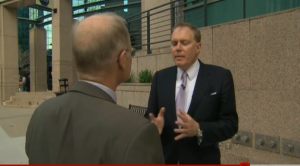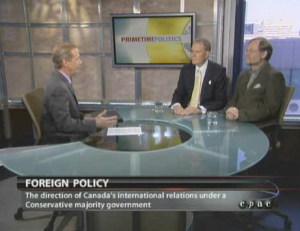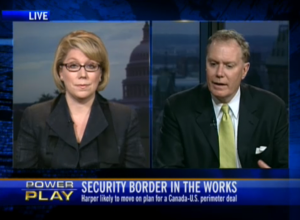From Embassy Magazine, May 4, 2011 Advancing Canadian Interests with the USA
Apart from a couple of tropes about the “Americanization” of our gun registration in the French language debate and Ralph Nader’s warnings about “deep integration,” one of the most remarkable features of this campaign was the absence of any reference to Canada-US relations and February’s Washington Declaration.
In the final days, Prime Minister Stephen Harper reminded Canadians that one in five Canadian jobs is linked to our trade with the US. He reaffirmed February’s pledge to reduce cross-border congestion through the creation of a perimeter security shield and tackle the regulatory thicket that impedes our shared competiveness. Now he and President Obama must act and get it done.
With Parliament likely to return to pass the budget, we should make passage of the copyright legislation a first order of business. This, the top American “ask,” is essential to attracting continuing foreign investment, especially given the challenge of our rising petro-dollar. Copyright protection is also a trade policy key to both the Canada-EU trade deal and our entry into the Trans-Pacific Partnership.
The original intent for the perimeter security agreement was to have an action plan by mid-June. This week’s Republican presidential candidates’ debate is a reminder that the US electoral clock is ticking and with it the window of opportunity for the border deal. To re-ignite the process, the leaders should appoint personal envoys to run interference and keep the schedule on track. Former ambassador to Washington Derek Burney or former BC premier Gordon Campbell both know how to get it done.
Premiers, who played a critical role in securing last year’s procurement reciprocity agreement, must be brought into the tent because they share constitutional authority for implementation. This would be a good opportunity to resurrect the First Ministers conference and demonstrate visibly to Canadians why this deal is in our interest.
Success in the US will depend on the support of state governments and premiers are our bridge to governors. Manitoba Premier Greg Selinger and Nova Scotia counterpart Darrell Dexter have a special mission: to convince Opposition Leader Jack Layton on why US trade puts bread on the table and sustains union jobs. The return to profitability of GM, Ford and Chrysler—the auto sector is our most integrated industry—is a case study in sensible collaboration between labor, business and government.
The Canadian business community is already onside and they’ve done valuable homework in laying out what needs to be done. But the American business community needs to step up to the plate. Their participation is necessary because they are best placed to point out to Congress and state legislators the 8 million American jobs and billions in investment that depend on trade with Canada.
Then there’s the irritants and crises that require the full-time attention of our capable ambassadors, Gary Doer and David Jacobson. For American “wise man” George Shultz, former US secretary of state, managing the Canada-US relationship is like tending a garden. “The way to keep weeds from overwhelming you,” he wrote in his memoir, “is to deal with them constantly and in their early stages.”
On the American side, President Obama must be satisfied with the election results. In Prime Minister Stephen Harper he has a proven, reliable partner who has been returned to power with a stable, secure government. His Administration has dilly-dallied on the XL Keystone pipeline permit but it now appears that this will happen by the fall. We should learn from this lesson and invite the administration to look at all our connections: rail, electrical grids, pipelines, roads and bridges. Our mutual international competitiveness requires us to take these beyond the control of narrow interests.
Nowhere is the abusive power of special interests more perniciously illustrated than in the protracted opposition by the operator of the Ambassador Bridge to the construction of the Detroit River International Crossing. With a quarter of our trade passing through this gateway, it is time for President Obama to intervene.
There are other “weeds” that need tending, including the New York State ballast water regulation that would effectively curb shipping on the Great Lakes and the ongoing pollution risk to the Red River from Devils Lake.
Prime Minister Harper has practiced Brian Mulroney’s golden rule for the conduct of relations with the US: We can disagree without being disagreeable. Now he needs to follow the second Mulroney dictum—Canada’s influence in the world is measured by the extent to which we are perceived as having real influence in Washington.
Influence requires a vigorous diplomatic and intelligence service bringing perspective on issues like nuclear proliferation, terrorism, climate change and the continuing economic crisis. It means more effort in regions where we have shared interests, especially the Americas. Or where we can bring special insight, as in China and India, where smart immigration policy has given us so much of their diaspora. Or fora where the US is absent and we have the ability to lead, like the Commonwealth and Francophonie.
Real influence also depends on being a reliable partner in collective security and helping the US bear the global burden of primacy, as we did by putting boots on the ground in Afghanistan, planes in the air over Libya and taking a lead role in the reconstruction of Haiti. The Canada First Defence Strategy will maintain our capacity by investing in new kit including ships and fighter jets.
With his win, Stephen Harper achieves new place and standing amongst global leaders. But our international leverage hinges on tending the garden next door. With his strong mandate, Prime Minister Harper can move quickly to advance Canadian interests and North American competitiveness. Now it’s up to President Obama to demonstrate his commitment to good neighbourliness.




